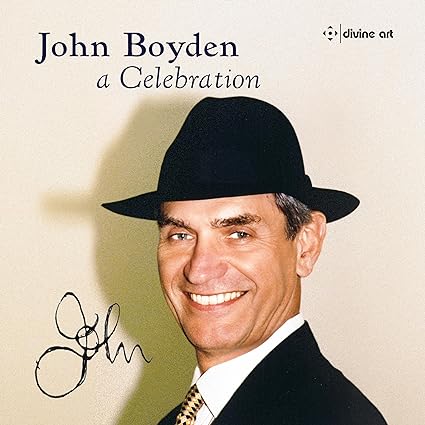
COLLECTIONS

Franz Schubert (1797-1828): Piano Quintet in A major, D. 667 ("Die Forelle/The Trout") Ludwig van Beethoven (1770-1827): Piano Sonata No. 21 in C major, Op. 53 ("Waldstein") Franz Schubert (1797-1828): Die Schöne Müllerin, D. 795
On the face of it, this might seem somewhat of a curate's egg of a release, containing as it does a combination of new and old releases, of famous pieces that have countless other versions available, often performed by better known artists that are performing here.
However, this holds interest for several reasons. Firstly, the reissues of the Waldstein sonata and the Die Schöne Müllerin song cycle are well respected performances, if not high in the public eye currently. Secondly, it draws attention to an interesting, some might say typically British idiosyncratic musical career that would probably be unusual nowadays. John Boyden is associated with the initial pioneering days of classical CDs, starting the once popular budget and semi-budget LP/CD labels Enigma Classics and Classics for Pleasure. For one that is of a certain age and a certain nationality mention of those labels recalls times when such releases were greeted with justifiable excitement and admiration. John Boyden did a lot more, running a large HMV Record shop in central London, managing the London Symphony Orchestra for a time, and starting the New Queen's Hall Orchestra (2nd iteration, re-founded in 1992). Outside of musical performances, it's a fascinating story with some controversial elements entwined.
The Trout Quintet is a new recording, the Beethoven and Die Schöne Müllerin performances are classics of the earlier CD era, and bear comparison with the many other great performances of these classics available nowadays.
It is certainly a pleasing collection, starting with the Trout Quintet. This is an intimate performance, perhaps not the highest powered, but enjoyable, nonetheless. The piano is given a prominent balance, not to the exclusion of the strings, but a forward balance in what sounds like a small room, and we are in the front row. The sound world is one that aims at clarity, and without being in the 'Original Instruments' world to aim at the gentler sound of instruments with an emphasis on expression rather than simply accuracy, and the merging of instruments into a harmonious whole rather than individual instruments dominating over the others.
The 'Waldstein' played by John Lill is an unashamedly great performance. I have long admired this pianist and would willingly listen to anything he played. My personal favorite 'Waldstein' is that by Maurizio Pollini on DG, but since Pollini is my favorite in almost anything he plays, I can still admire others. John Lill starts briskly and produces a thrilling end of this and the final movement. His Adagio is thoughtful and moves through the third movement Rondo to the start of the final Prestissimo which emerges truly and magnificently triumphal out of the darkness. At times, the level of acrobatic pianism is extraordinary. Lill is often described as a Beethoven specialist, he resisted that description, but his Beethoven is always humane and civilized, very much in accord with the music's Enlightenment aspirations. Recommended.
The Schubert cycle has so many great performances available, from both contemporary and historical perspectives. So, why choose this one? Firstly, it is beautifully sung. Ian Partridge's tenor is immediately heard as riding nimbly across the initially merry/naïve songs, and then wonderfully darkens for the gradual descent into despair. Essentially, I would describe the performance as sounding clean and unmannered. I remember buying this when it first was released on Classics for Pleasure label (decades ago now), I was not sure I would enjoy Schubert or indeed any Romantic song cycles, but this performance drew me to them. The giants in such cycles include Dietrich Fischer-Dieskau, especially accompanied by Gerald Moore who with their more deliberate expression conveys multiple different aspects. However, I still overall prefer to hear the Partridges, though either could be one for the desert island, along with several more recent performances, such as those sung by Ian Bostridge, and Christoph Prégardien amongst the tenors. The choices are many, with baritones, mezzos, accompanied by guitar etc...
So, in the end, the reasons for buying this would seem to be either in recognition of Boyden's life, or possibly nostalgia for the reissue, but finally for the chance to sample some highly rated, but under the radar classics of the earlier Romantic era. If the program suits your interest, you will be getting some cultivated performances with good recording.
Ian Orbell - March 2024